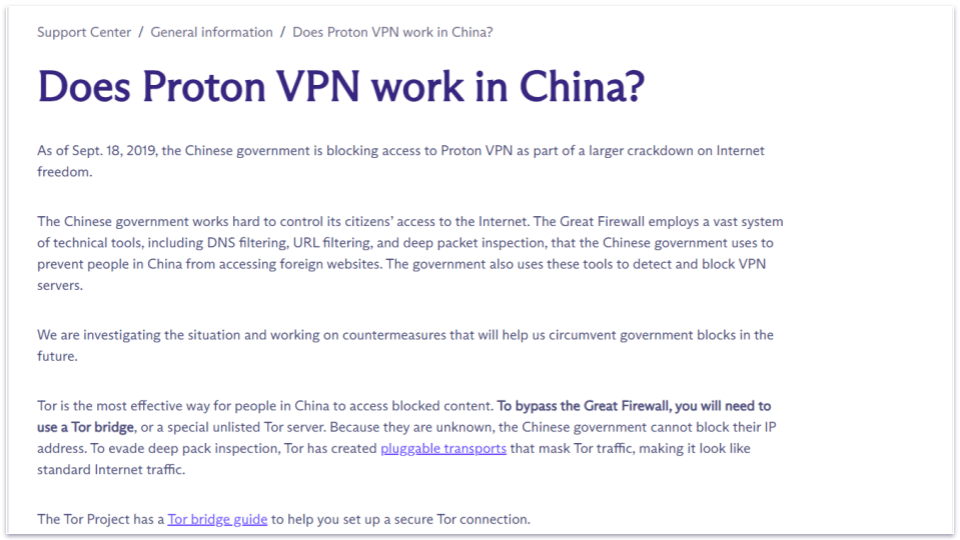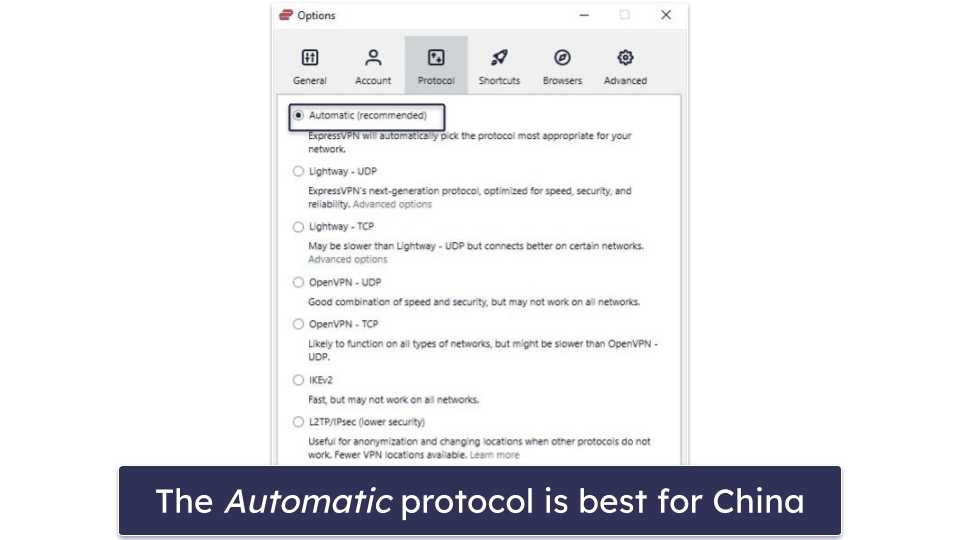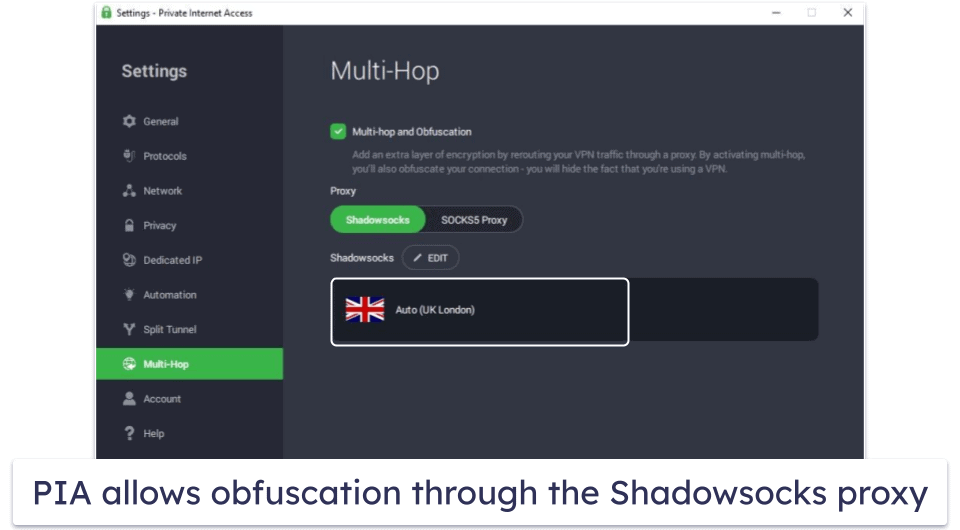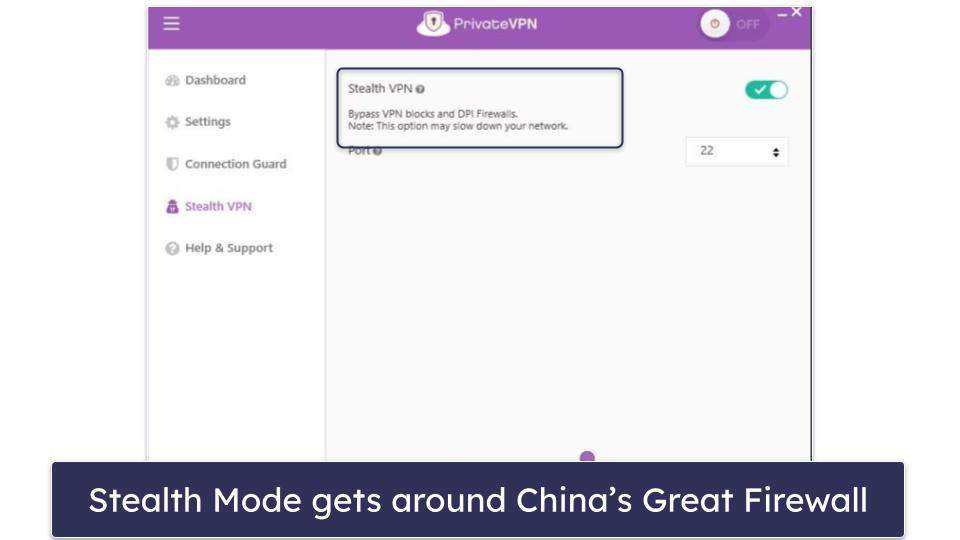
Updated on: December 20, 2024
Short on time? Here’s the best VPN for China in 2025:
- 🥇 ExpressVPN : Has obfuscated servers that can get around restrictions in China and maintains the fastest speeds even with obfuscation on. The VPN has a vast server network, including locations near China. All plans have a 30-day money-back guarantee.
Unfortunately, Proton VPN doesn’t work in China. The country uses a sophisticated firewall that censors lots of content that the Chinese government doesn’t want its people to have access to. It also blocks VPNs, which is why Proton VPN and many other VPNs can’t connect there.
However, I found some really good alternatives that work in China. I recommend ExpressVPN because it has effective obfuscation that can bypass censorship in the country, offers mirrored links for downloading its apps in China, and provides super-fast speeds with obfuscation on.
Editor’s Note: VPN connections in China may experience occasional disruptions due to censorship. However, ExpressVPN remains mostly reliable and provides a 30-day money-back guarantee for new users. Also, note that using a non-government-approved VPN in China may be illegal. While there are no reports of the government punishing individuals for VPN use, it’s crucial to follow local laws. We don’t endorse VPN use for illegal activities.
Editors' Note: ExpressVPN and this site are in the same ownership group.
Does ProtonVPN Work in China?
Proton VPN faces challenges in China due to its sophisticated firewall, which controls and restricts internet access. The firewall uses various technical methods, including DNS filtering, URL filtering, and deep packet inspection to restrict access to social media, news, and messaging apps and sites. Plus, the firewall detects and blocks access to many VPN servers and IP addresses.
Despite ProtonVPN featuring obfuscation technology, which is designed to disguise VPN traffic and bypass censorship of this type, the restrictions in China are particularly stringent. ProtonVPN itself says its service struggles to operate in China.

Plus, as of Sept. 18, 2019, the Chinese government had included Proton VPN in its blocklist, preventing users in China from using the service. As a result, the ProtonVPN website cannot be accessed from China, and even if somehow you manage to do that, you won’t be able to purchase a subscription from within the country.
The VPN is actively investigating and developing countermeasures to bypass government blocks. Although some users have reported that they’ve managed to get Proton VPN to work there, as of now, several customer support reps I talked to confirmed that you’re unlikely to connect to any of its servers from China.
Read more about Proton VPN in our full review
Proton VPN Not Working in China? Try These Troubleshooting Steps
Proton VPN doesn’t work in China, but if you already have a subscription and want to try and make it work there, here are some troubleshooting steps that may help you:
- Use a Tor bridge or an unlisted Tor server. A Tor bridge uses pluggable transports to disguise your Tor traffic as normal internet traffic and bypass the Chinese Firewall’s deep packet inspection. A special unlisted Tor server is a server that isn’t publicly listed, so its IP addresses remain unknown to the Chinese government, making them difficult to block. You can find more information about how to use these on The Tor Project’s site. Note that Tor is blocked in China, so this will work if you’ve downloaded it before arriving in the country.

- Enable the Stealth protocol. Stealth is Proton VPN’s proprietary protocol which makes your VPN traffic resemble regular internet traffic to avoid VPN blocks. This feature is currently supported on Proton VPN’s Android, iOS, and macOS apps.

- Switch protocols. On Windows and Linux, you can turn to ProtonVPN’s Smart protocol option, which automatically detects and switches to the best available VPN tunnel in your location. Alternatively, you can try using OpenVPN TCP, as it’s good at helping maintain a stable connection even when network conditions are less than ideal, such as when dealing with deep packet inspection, which the Chinese Firewall uses.

- Turn on Alternative Routing. If you haven’t downloaded all the Proton VPN apps for all of your devices before you got to China, enabling Alternative Routing on a device that has the Proton VPN app may allow you to access the Proton VPN site to download the apps you need. This feature helps you connect to Proton’s site by using alternative third-party routing methods that are less likely to be blocked, such as Amazon Web Services (AWS), but there’s no guarantee it’ll work in China.

- Try a different server. Try connecting to a couple of different server locations and be patient — you might have to wait for up to a minute to see whether the VPN can connect to the server. Alternatively, you can use Proton VPN’s Quick Connect feature, which allows Proton to select the optimal server for you. Remember to refresh the server list before attempting a new connection.

- Update the VPN app. Keeping your ProtonVPN app up-to-date is crucial, as developers regularly enhance security features and fix connectivity issues.
- Clear your cache. Resetting the VPN app’s cache will get rid of any temporary files and data that may interfere with its operation, which can help resolve connection issues. It’s also a good idea to clear your browser’s cache because the information store may be leaking your IP address or other data revealing your geographical location.

- Reset your DNS settings. Incorrect or poorly configured DNS can hinder your device’s ability to resolve domain names efficiently, impacting overall network performance. Switching to ProtonVPN’s DNS means routing DNS queries through encrypted channels, which can potentially bypass DNS-based censorship and provide smoother access to geo-restricted content.

- Contact customer service. Proton VPN’s customer support reps have repeatedly told me there’s no guarantee the VPN would work in China, but if you still want to contact them you can reach them via email at support@protonvpn.zendesk.com. The live chat feature may not be available, as the website is typically blocked in China.

- Consider a new VPN that works in China. If none of the above steps work, you may need to look into alternative VPN providers that work in China.
Best VPNs That Still Work in China in 2025
Quick summary of the best VPNs for China:
- 1. 🥇ExpressVPN — Best VPN for China (obfuscation on all servers + super fast speeds).
- 2. 🥈Private Internet Access — Secure VPN with customizable apps + obfuscation tools.
- 3. 🥉PrivateVPN — Good for ease of use (intuitive interface and decent speeds).
Editors' Note: Intego, Private Internet Access, CyberGhost and ExpressVPN are owned by Kape Technologies, our parent company
🥇1. ExpressVPN — Best VPN for China With Fast Speeds & Strong Security
ExpressVPN is my top choice for China. It has highly effective obfuscated servers that disguise your VPN traffic, so it looks like regular internet traffic (which the firewall won’t block).
ExpressVPN supports obfuscation on all servers in 105 countries, so you can connect to any location from China. It also offers obfuscation across all protocols but recommends using the Automatic protocol setting for China. What’s more, ExpressVPN is the fastest VPN on the market, and its super-fast — even with obfuscation enabled, which typically slows down your connection speeds considerably.
I like, too, that the VPN regularly refreshes its IP addresses, making it harder for the Chinese government to detect and block them. ExpressVPN also provides mirrored links, which are copies of its site with different URLs. If you’re having issues accessing the official site, you’ll be able to visit the ExpressVPN site and download the VPN in China with the new link. To get a mirrored link, you’ll need to email ExpressVPN’s customer support reps, who are highly knowledgeable and very quick to respond.

This provider also has split-tunneling, which lets you choose which apps use the VPN tunnel and which use the local network. This has a couple of benefits, like giving you faster speeds and allowing you to use local apps (like map and food delivery apps) while connected to the VPN.
It’s great for streaming in China, too — it works with 100+ streaming services, including several Netflix, Amazon Prime, Max, and Disney+ libraries.
ExpressVPN has plans starting at $4.99 / month. All of the VPN’s plans have a 30-day money-back guarantee.
Bottom Line:
ExpressVPN is the best VPN for China. It has obfuscation on all of its servers and regularly refreshes its IP addresses. What’s more, it maintains fast speeds and has a large server network. The VPN also offers mirrored links to download the VPN in China safely. All of its plans have a 30-day money-back guarantee.
Read the full ExpressVPN review
🥈2. Private Internet Access — Highly-Customizable VPN for China
Private Internet Access (PIA) lets you tweak your connections to safely browse in China. It uses the open-source Shadowsocks proxy for obfuscation, which PIA’s email and live chat representatives confirm work in the restrictive country.
The Shadowsocks proxy servers are located in 6 countries, including Japan and the Netherlands. These servers are located under Settings and Multi-hop, so you can find and connect to one of them in just a few clicks. That said, I recommend checking ExpressVPN if you’re looking for more server options, as it supports obfuscation on all servers.

I’m a big fan of PIA’s customizability, so you’re not only restricted to its Shadowsocks servers and can connect the rest of its servers in 91 countries. You can manually choose the OpenVPN TCP protocol and select port 433, which is very difficult for Chinese authorities to ban because it’s essential for secure HTTPS traffic — so, it usually gets around censorship in China. PIA also allows you to create your own configuration files and tailor connection stability and performance specifically for use in China.
I like that PIA includes a virtual Chinese server in Beijing, which means you can get a Chinese IP address, but the physical server is located in Singapore. This way, you can privately and securely browse the web.
Private Internet Access offers affordable plans that start at $2.03 / month. Each plan has a 30-day money-back guarantee.
Bottom Line:
Private Internet Access is a highly customizable VPN that’s great for China. It provides obfuscation through Shadowsocks proxy servers and has features that allow you to optimize your VPN connection for the best performance in China. It also has a vast server network, and all plans have a 30-day money-back guarantee.
Read the full Private Internet Access review
Editors' Note: Private Internet Access and this site are in the same ownership group.
🥉3. PrivateVPN — Intuitive VPN With Decent Speeds
PrivateVPN is a user-friendly VPN for China. It has an obfuscation protocol called Stealth Mode, which uses obfuscation to mask the VPN traffic and make it look like any other normal internet traffic.
The VPN is a good pick for those new to VPNs because it’s very easy to find in the Settings (there’s a separate tab only for this option once you click on Advanced View), enable Stealth Mode, and connect to a server. You can even choose port 443 for better network stability in China. Then, you can easily switch to Simple View, which only shows you connection options.

This provider has servers in 63 countries, all of which work with Stealth Mode on. Allow PrivatevPN’s server network is smaller than ExpressVPN and Private Internet Access, the servers are evenly distributed around the globe, including in nearby Hong Kong, Japan, and Singapore.
I also really like its Application Guard for China. This feature is like a customizable kill switch — it shuts down selected apps if the VPN connection disconnects, which is very convenient if you only use the VPN for some apps in China.
PrivateVPN’s plans start as low as $2.00 / month, which is pretty cheap. The VPN backs all of its plans with a 30-day money-back guarantee.
Bottom Line:
PrivateVPN is very easy to use and great for beginners. Obfuscation is easy to enable, and its servers, all of which support obfuscation, are evenly spread out across the globe. Moreover, it has low-cost plans that come with a 30-day money-back guarantee.
Read the full PrivateVPN review
Quick Comparison Table
Editors' Note: Intego, Private Internet Access, CyberGhost and ExpressVPN are owned by Kape Technologies, our parent company
Testing Methodology: Comparison & Ranking Criteria
I followed our detailed testing methodology, so the VPNs I recommend are the best alternatives for Proton VPN in China. This involved assessing accessibility, security, speed, user-friendliness, and overall value. Here’s how I evaluated and ranked each VPN:
- I made sure every VPN works in China. The alternatives I recommend use obfuscation methods that work with China’s Great Firewall.
- I verified accessibility from China. Each VPN provider offers a mirror link so you can download and install the VPN even if their main websites are blocked.

- I checked security and privacy. I only pick VPNs with 256-bit AES encryption to protect your privacy in China and prevent keyword and website blocking, a kill switch to avoid data exposure if the connection drops, and strict no-logs policies to ensure no data is shared with the Chinese government.
- I tested connection speeds. I conducted speed tests with obfuscation on, which is crucial for bypassing deep packet inspection. Every VPN on my list offered good speeds that didn’t severely impact internet usability. ExpressVPN is the fastest.
- I assessed each VPN’s user-friendliness. The VPNs I recommend have easy-to-use apps for both desktop and mobile apps and make it very simple to activate obfuscation, which is essential for bypassing the Great Firewall of China.

- I confirmed value for money. I compared pricing plans, extra features like split-tunneling, and the number of simultaneous connections allowed. I also made sure you get a money-back guarantee to try the service risk-free.
How to Use a VPN in China
1. Pick a good VPN that works in China. My recommendation is ExpressVPN because its obfuscated servers can evade detection in China, and it offers the fastest speeds over obfuscation.

2. Download the VPN. You can download the VPN app from the vendor’s official site or from your app store. Then, make sure to follow the on-screen instructions. It’s also advisable that you download and install the VPN before visiting China, as most VPN sites and apps are blocked by the government.

3. Open the VPN app & connect to a server. Scroll through the server list and pick a server. For the best possible speeds, connect to a server location near China, like Hong Kong or Taiwan. Please note that ExpressVPN automatically turns obfuscation on, but with other VPNs, you’ll have to first enable obfuscation and then connect to a server.

4. Browse the internet freely. Enjoy normal browsing of the web safely in China!
Editors' Note: ExpressVPN and this site are in the same ownership group.
How to Download a VPN If You’re Already in China
If you’re already in China, you probably won’t be able to access any VPN site, as they’re almost all blocked by the government. Here are some alternative methods you can use to download a VPN in China:
- Use mirrored links. Mirrored links make it harder for firewalls to detect and block them, as they are a copy of the VPN’s website with a different URL. ExpressVPN offers mirrored links but you’ll need to contact its customer support to get access.
- Use a free proxy. A proxy changes your IP address but it doesn’t encrypt your traffic. With a web proxy, you can just copy-paste the VPN’s site link in the search field.
- Ask for help from a friend outside of China. You can ask a friend who is living outside of China to sign up with the VPN and download it. Then, they can send you the installation files and login credentials via email.
- Use the SIM card from your country. If your SIM card enables roaming, you can use it to access the internet and sign up for the VPN through their official website. Because your roaming data isn’t controlled by your Chinese ISP, you can bypass any government firewalls or restrictions while using it.
- Email the VPN’s support to request the .apk app if you’re an Android user. If you’re an existing VPN subscriber using an Android device, consider installing the .apk app directly, bypassing the need for the app store. You can acquire the most recent .apk file by reaching out to the VPN’s email support team.
- Consider planning a trip to Hong Kong or Macau. While Chinese authorities conduct some online monitoring in these regions, they operate beyond the Great Firewall. This means that you’ll be able to access the VPN’s website, sign up, and download the app while in these areas.
Frequently Asked Questions
Does Proton VPN’s free plan work in China?
No, Proton VPN’s free version (as well as the paid ones) doesn’t work in China. This is because of the Chinese government firewall that restricts individuals from accessing foreign sites and blocks VPNs. Luckily, all the VPNs on this list work in China.
Which VPN is the best for China?
ExpressVPN is the best VPN for China. It has obfuscation on all servers and protocols, it maintains the fastest speeds on the market, and it comes with user-friendly apps.
Which VPNs work in China?
The VPNs in my list can get around government restrictions in China. That said, my top choice is ExpressVPN, as it has obfuscation on all of its servers, maintains the fastest speeds on the market, and has advanced security features.
Are VPNs illegal in China?
The use of VPNs that the government doesn’t approve may be considered illegal. The Chinese government allows certain VPNs to operate as long as they share data with the state, so your data won’t be protected if you use them.

